Most Notre Dame seniors left in early March for spring break, expecting to return for the most memorable part of their undergraduate years: social outings, traditional senior class activities, commencement, making memories to last a lifetime.
Suddenly, before they knew it, their campus days were over.
Because of the coronavirus pandemic, Notre Dame suspended in-person classes for the rest of this spring semester, shifting all courses online. Residence halls are vacant of students and the campus is nearly empty.
Members of the Class of 2020 are thrust into a new reality: living at home or off-campus, taking classes online and keeping in virtual touch with friends and family, protecting themselves and others from the virus, wondering and worrying about the future.
South Bend and St. Joseph County on March 18 issued an emergency declaration and advisory against non-essential travel. Indiana followed with a statewide “stay at home” order that went into effect March 26. All residents, except for essential workers, are expected to stay home unless they are taking part in permitted activities, which include exercise, caregiving, grocery shopping or obtaining other needed supplies.
Amid the disruption, some Notre Dame off-campus seniors have chosen to continue living and studying in South Bend for now. Here are some of their stories:
Quentin Colo
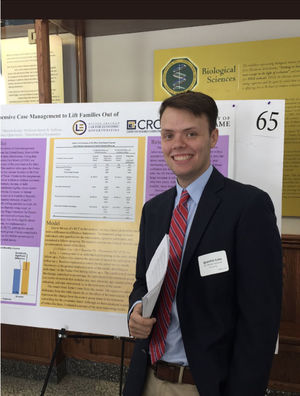
“We’re quarantining with each other,” says Quentin Colo, an economics and math major from Scranton, Pennsylvania, who serves as a student senate off-campus representative. He’s living with seven other seniors in a rental house east of downtown South Bend.
Rent on the house is paid. Some of his housemates decided to stay in South Bend because they have family members at home who work in health care and they didn’t want to increase the risk of transmitting the virus.
Based on participation in a recent online student chat, Colo estimates more than 200 Notre Dame seniors continue to live in South Bend while taking their classes online during the pandemic.
The students, despite disappointment over the abrupt end of their time on campus and the announcement this week that the May commencement will be online rather than in Notre Dame Stadium, share humorous memes among themselves to try to find a bright side. But they know the reasons for the campus shutdown are deadly serious.
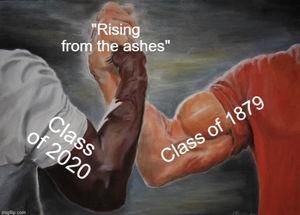
Colo was in Fort Lauderdale, Florida, for spring break when he got the news that the University would cease in-person classes and shift to online learning. He says the online classes are going OK. “Virtual learning is much more difficult,” he says. “It’s been an odd transition.”
He’s in the midst of applying for post-college jobs. He’s not sure how much the pandemic and the related economic downturn will affect the job market. Colo feels bad for sophomores and juniors, some of whom are having summer internship offers revoked because of the virus and the economy.
The group of eight in Colo’s house is staying to themselves, keeping away from other student groups and houses. “We’re practicing social distancing to flatten the curve. We’re taking the virus very seriously,” he says. “I pretty much stay home. Most days I don’t leave the house unless I go for a run.” He’s been to the grocery store a couple times and cooks his own meals.
A typical day in the house involves waking up by 10 or 11 a.m., having coffee together, perhaps playing some games, participating in online classes and doing homework. The guys watch some TV shows as a group and spend time each day talking about the uncertainty of the future. Students are realizing the pandemic likely will have a huge effect on their generation.
“We foresee this impacting us for years and years,” Colo says, “Jobs, relationships, everything.”
Georgia Twersky
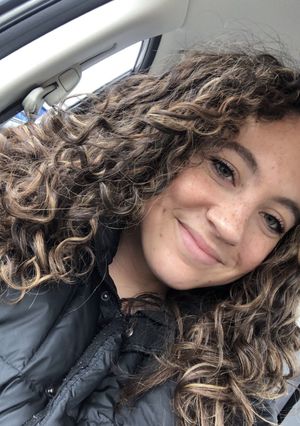
“I’ve been completely alone for a week,” Georgia Twersky says on the phone from her off-campus apartment. A senior from Los Angeles, Twersky spent spring break with seven other Notre Dame friends in Cancun, Mexico. While they were gone, the coronavirus was declared a pandemic and students were notified that Notre Dame would shift to online classes.
Twersky and her friends returned to South Bend to get winter clothing, laptops and their school work. On-campus students were able to make brief visits to their residence halls to collect some of their belongings.
Her friends returned to their family homes, but Twersky decided to stay in South Bend. Her parents and younger brother live in a small two-bedroom apartment in Los Angeles, and her mother works as an administrative assistant in a hospital. “They kind of already consider me moved out,” says Twersky, a first-generation college student.
For now, she’s living alone, studying, working on senior projects and keeping isolated from others in the apartment building and the community. She talks with her mom via FaceTime several times a day.
“I know there are people here in the building and I know they are hanging out (together), but I’ve been keeping my distance,” Twersky says. She’s made two quick trips to a grocery store and cooks for herself. For exercise, she runs to the nearly vacant campus to visit the Grotto.
Twersky already has a post-college job lined up. In July, she’ll start work as a development program associate at Roche Diagnostics in Indianapolis. The firm recently gained approval to provide coronavirus test kits.
She’s sad she didn’t get to say goodbye in person to professors and many college friends.
“I’m starting to realize how wonderful it was to be a University of Notre Dame student, and how much I took for granted,” she says. “Nothing is guaranteed.”
Amber Grimmer
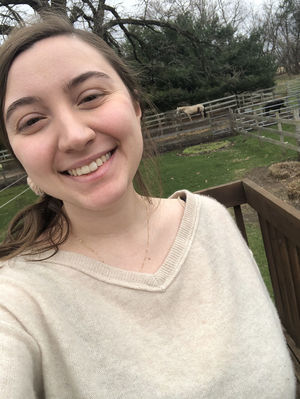
Amber Grimmer was on a spring break trip to Ireland that was cut short by news of the pandemic. The senior from Portland, Oregon, returned to campus and removed basic belongings from her Flaherty Hall room.
With campus shut down, she’s now living alone in a South Bend house that her family rented as a place for her to stay during the quarantine. “I was feeling so hopeful (about in-person classes resuming), I didn’t see the point of going home,” Grimmer says. “I was hoping my roommate would stay with me. Now I wish I was home.”
Grimmer goes for solo walks and has visited the houses of Notre Dame friends a couple times. She cooks for herself. She’s trying to maintain a regular daily schedule, including online classes and homework, but finds it challenging amid the stress of the quarantine. “School doesn’t feel real to me at this point,” she says.
The University on March 27 announced changes to student grading for this semester. Undergraduates will have the opportunity to view their final course grades and then choose whether to accept them or elect a pass/no credit option.
Grimmer isn’t sure what the post-graduation world will be like for her and her classmates. She’s hoping to hear soon about a fellowship for which she applied. A classmate who accepted a job offer told her it’s now been rescinded because of the economic downturn.
Grimmer realizes her college years are ending, but has no idea what might lay ahead.
“I feel like I’m in mourning for what I’ve lost,” she says.
Patrick Paulsen
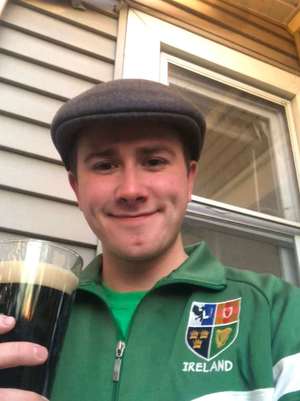
Patrick Paulsen is living in an off-campus house with nine other Notre Dame seniors. “Going home was never much of an option,” says Paulsen, whose hometown is Seattle, where the first U.S. cases of COVID-19 were diagnosed in late January.
He was on spring break in Miami when he got the news Notre Dame would shut down in-person classes. “You felt like you needed to take a big breath,” he says of his reaction.
Paulsen and his family decided South Bend was a relatively safe place for him to remain. He and his housemates stay mostly to themselves, avoiding contact with others, even other nearby student houses. “We’ve become more secluded as this has become more serious,” he says of the health risks.
Paulsen goes out about once a day for a walk or to buy groceries. He visited campus once. “It’s a ghost town,” he says. “It’s really eerie.”
He had planned to get a job for a couple years after graduating, then attend law school. With the economy in decline because of the pandemic, he thinks jobs for recent college graduates will be scarce. “Job searching is not possible right now,” Paulsen says. He may instead focus on studying for the LSAT and apply for law school admission.
Paulsen is disappointed there won’t be a traditional commencement ceremony for his class. “It’s definitely sad,” he says. “This whole experience is about making the best of it.”
He and his housemates talk daily about the abrupt shift in their world.
“This is a once-in-a-hundred-years kind of thing,” he says.
Will Linczer
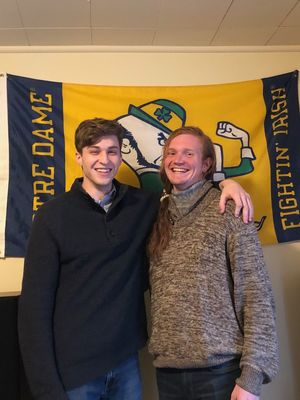
Senior Will Linczer is living in an off-campus house with a roommate, a fellow senior from Niles, Michigan. Linczer grew up in South Bend in a family of 10 children. When the University shut down in-person classes, he decided to stay at his off-campus rental, because the rent was paid and his parents had their hands full with six of his siblings at home.
Linczer, a member of the Notre Dame Glee Club, was on a Glee Club spring break tour when they got the news about the campus shutdown. He says he realized the need to end the tour early and return to South Bend.
His daily schedule now involves waking up about 9 a.m., then joining his online classes. His desk and computer are five feet away from his bed. “My whole world is pretty small right now,” Linczer says.
An industrial design major, Linczer says Notre Dame arranged a software license that allows him and his classmates access to sophisticated design programs that generally they could use only on campus. “My work isn’t too affected by the shutdown,” he says, but without the daily interaction and feedback from peers and professors that is typical on campus, “it’s not the same.”
Linczer and his roommate stay mostly at home, except for occasional visits to their families. “We know people who know people who have COVID-19,” he says. “I don’t leave unless I have to.”
When the lease is up in June, Linczer says he’ll probably move back to his parents’ home. Amid the economic slump, he’s read news of hiring freezes by design firms. “I’m probably not going to be getting a job (in the design field) this summer,” he says.
He acknowledges he’s nervous about the future and realizes the pandemic could have long-lasting consequences.
“How the government and the country handle this is going to impact how we look back on it,” Linczer says.
Noreen Maloney

“Part of me wants to go home,” says senior Noreen Maloney, who is living in an off-campus house with two roommates. From the Upper Peninsula of Michigan, she decided to stay in South Bend during the campus shutdown because of the unreliability of internet and other services in her rural hometown.
Maloney received news about the shift to online classes during spring break, when she was on a field geology course in Death Valley, California. Since her return to South Bend, she’s been keeping herself socially isolated and focusing on her school work.
She is a fifth-year student in the Notre Dame/Saint Mary’s College dual-degree engineering program. She participated in the Saint Mary’s commencement ceremony last spring, when she completed her college degree. She was looking forward to receiving her Notre Dame bachelor’s degree at the May ceremony. Maloney read from a journal she’s keeping during the COVID-19 quarantine: “I think graduation isn’t going to happen. My heart aches for it.” The next day, she got the news that the University’s commencement would be held online.
“There’s such a feeling of loss that comes with it,” Maloney says of all the typical senior activities that she and her classmates must forego. No senior week, no caps and gowns, no commencement photos, no farewell hugs.
Maloney says she had several job interviews lined up, but everything is delayed or canceled now because of the pandemic. “They say they can’t fill the position,” she says.
In high school, Maloney did a research project on life-defining historical events and the characteristics needed to survive them.
“Some of that prepared me for this,” she says. “All of these emotions seem familiar.”
Federico Ivanissevich
Federico Ivanissevich was in Las Vegas on a cross-country spring break road trip with friends when he got the news Notre Dame would switch to online classes. “It was kind of expected,” he says, “because other universities did it first.”
The group returned to South Bend. Ivanissevich and a roommate continue to live in their off-campus apartment in Roseland, attending their online classes and settling into a new daily schedule.
“We’re hunkering down,” he says, describing waking up each day, attending online classes and doing schoolwork. They’ve turned a spare room into a home gym and adhere to evening workouts. They bought some supplies, including painting kits and a puzzle, to provide temporary daily respites from worry about the pandemic. They’ve been to a grocery store a couple times and cook their own meals.

Ivanissevich is an international student who most recently lived in Brazil. His parents now live in Argentina, which as of April 1 had more than 1,000 confirmed cases of COVID-19.
“If it were up to my parents, I’d be there now,” he says. “I’m here against their wishes, but I’m worried I’d catch the virus and pass it on to my parents.”
Ivanissevich, who has dual American and Peruvian citizenship, also doesn’t want to leave the country and find himself shut out if more national borders close because of the pandemic. A finance and economics major, he is scheduled to start a full-time job in August at a Chicago firm. He expects to stay in his off-campus apartment until then.
He hasn’t had much time to dwell on how the global health and economic crisis will impact his generation. “It was so out of the blue. That’s how these things happen,” Ivanissevich says of the pandemic and the campus shutdown.
He hopes Notre Dame alumni will reach out to members of the Class of 2020 and underclassmen, perhaps providing advice about how they responded to adversity, such as the financial crisis of 2007-2008 and the subsequent recession.
Ivanissevich has visited campus only once since returning from spring break. He remembers all the times he walked to class and ran into classmates, peers to whom he won’t get to say goodbye.
“I miss that day-to-day recognition of people I will probably never get to see again,” he says.
Margaret Fosmoe is an associate editor of this magazine.